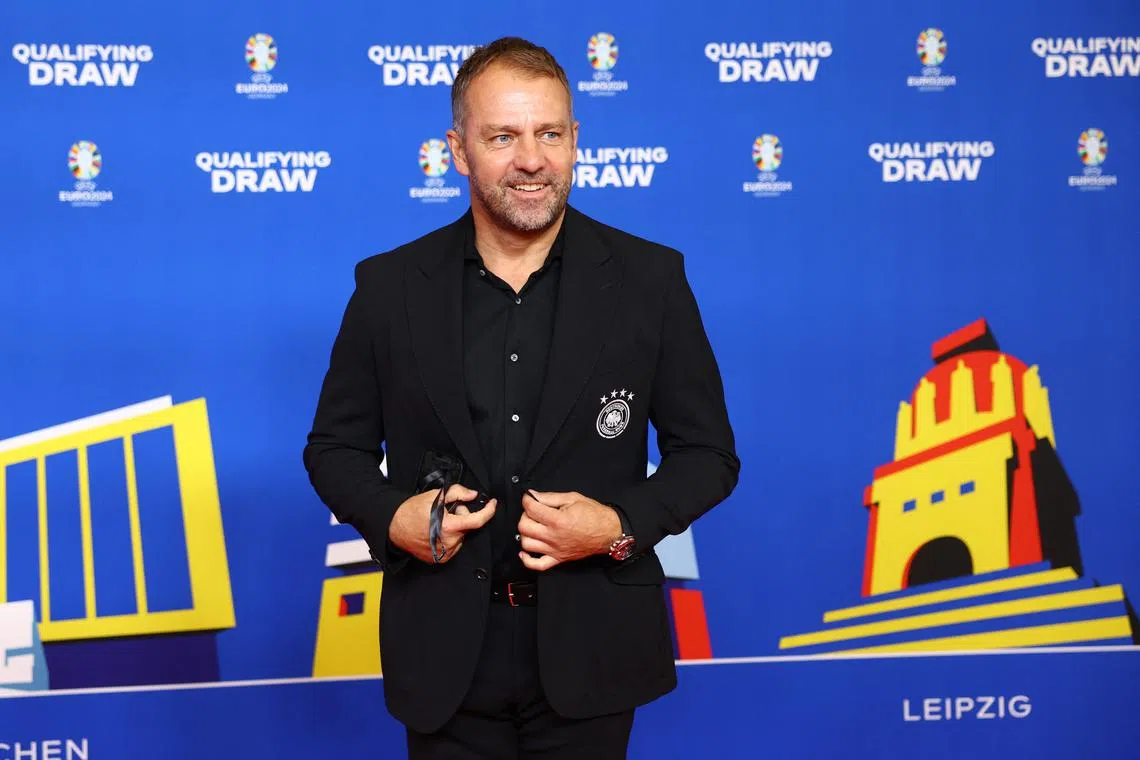World Cup: Group E favourites Germany hoping to rise from Low ebb
Sign up now: Get the biggest sports news in your inbox

Flick’s mission to restore German pride will be helped by the familiarity within the ranks
PHOTO: REUTERS
The kit is still predominantly white and some key figures of the 2014 World Cup triumph, such as Thomas Muller, Mario Gotze and Manuel Neuer are still around, but Germany will arrive in Qatar with one distinct difference in the dugout.
Failure at the 2018 World Cup and Euro 2020 resulted in an end to Germany’s 15-year love affair with Joachim Low. Their new beau is Hansi Flick,
Flick’s mission to restore German pride will be helped by the familiarity within the ranks. Eight of the players in the Germans’ 26-man squad have already achieved success with Flick at club level with Bayern Munich.
While progression into the knockout stages will be the minimum target, no one is expecting the Germans to go all the way. The ultimate goal is more long term: the Euros on home soil in 2024.
To that end, Flick has overseen a revamp. Only 11 players – including Muller, Neuer, Leon Goretzka and Joshua Kimmich – remain from 2018. He has added an exciting mix of young talent such as the uncapped Youssoufa Moukoko (17), Jamal Musiala (19), Karim Adeyemi and Armel Bella-Kotchap (both 20).
Hoping to avoid strike three
Disappointment in 2014 and 2018 means that Spain will want to ensure that this will not be a third successive World Cup to forget. They head to Qatar in a far more stable position than four years ago, when their coach Julen Lopetegui was sacked on the eve of the tournament.
Luis Enrique has impressed so far, guiding Spain to the Euro 2020 semi-finals, the 2021 Nations League final and the last four of the 2023 Nations League Finals. Spain’s strength clearly lies in midfield but question marks remain over whether they have enough at the back and up front to trouble the elite sides.
Enrique has opted for a largely inexperienced squad. Only four players – Jordi Alba, Sergio Busquets, Koke and Alvaro Morata – have more than 50 caps.
He has instead placed his faith in young stars like 2022 Golden Boy winner Gavi, 18, and his equally talented Barcelona teammate Pedri, 19, who won the gong in 2021.
Already under scrutiny
Even before Japan kick off their campaign in Doha, there has already been discontentment over coach Hajime Moriyasu’s decision to leave out Celtic duo Reo Hatate and Kyogo Furuhashi.
Moriyasu’s argument would be that there is still talent in abundance, which reflects the proliferation of Japanese players in Europe, with 20 of the 26 called up plying their trade on the continent.
Some, like Wataru Endo (VfB Stuttgart), Takehiro Tomiyasu (Arsenal), Takefusa Kubo (Real Sociedad) and Daichi Kamada (Eintracht Frankfurt) are established players for their clubs.
Moriyasu is targeting the quarter-finals for a side that has never gone past the round of 16.
But even the most optimistic Japanese fan will describe that as a lofty ambition.
Last but hopefully not least
The 32nd and final team to qualify for the World Cup, Costa Rica will be looking to ensure they do not just make up the numbers in Qatar.
The majority of the Costa Ricans play their club football back home in the Liga Promerica.
While that may mean familiarity among the squad, it is hardly regular match practice against the elite.
But they still ended their Concacaf World Cup qualifiers with a seven-match unbeaten run, which included victories over the United States and Canada.
Their strategy is clear: Defend resolutely and make the most of the odd chance they get.
In the qualifiers, they conceded just eight goals in 14 matches – only Canada let in fewer – but found the net only 13 times, the least among the Concacaf nations that have qualified.
Will their backline be able to hold out against the might of Spain and Germany?
Probably not.
GROUP D FIXTURES
Germany v Japan (Nov 23, 9pm)
Spain v Costa Rica (Nov 23, 11.59pm)
Japan v Costa Rica (Nov 27, 6pm)
Spain v Germany (Nov 28, 3am)
Japan v Spain (Dec 2, 3am)
Costa Rica v Germany (Dec 2, 3am)
TEAM FACTFILES
SPAIN
Last World Cup: Round of 16
Best World Cup performance: Champions (2010)
Fifa Ranking: 7
Record in qualifying: 6 wins, 1 draw, 1 loss
The coach : Luis Enrique
The Spanish tactician will be one of the most high-profile coaches at the World Cup, helped largely by the 2014-15 season when he led Barcelona to a treble which included the Champions League.
Enrique has already made an impact on the national team tactically. Gone are the days when La Roja passed their opponents to death, with Enrique’s Spain employing a more direct and vertical passing style where the ball gets to the forwards quicker.
It may not be as easy on the eye as tiki-taka but in Enrique’s version of 4-3-3, results take precedence over style.
The star: Pedri
Once compared to Spanish icon Andres Iniesta, who was a pivotal part of the 2010 World Cup-winning side, Pedri has the world at his feet.
The central midfielder will turn 20 a couple of days after their group opener, but he operates like a seasoned pro for club and country and is already deemed one of the best midfielders in world football.
Just as he does for Barcelona, he will be expected to be his side’s most advanced midfielder on his World Cup debut, where he will be able to exhibit his exquisite passing and creativity.
GERMANY
Last World Cup: Group stage
Best World Cup performance: Champions (1954, 1974, 1990, 2014)
Fifa Ranking: 11
Record in qualifying: 9 wins, 1 loss
The coach: Hansi Flick
Flick spent eight years as Germany’s assistant coach under Low. But he’s not just any protege.
He took up the national team role after leading Bayern to a famous treble in his first campaign, securing the Champions League after domestic success in the league and German Cup.
Using his favourite 4-2-3-1 set-up, his German team are a delight to watch, with a focus on possession and counter-pressing.
The star: Manuel Neuer
The skipper helped Germany win the 2014 World Cup and for his performances, he received the Golden Glove award as the tournament’s best goalkeeper.
Eight years on, at 36, he remains arguably the world’s best custodian. Neuer’s intelligence allows Germany to play a high line and press high to win the ball but few remember that he is also an excellent shot stopper.
With Leroy Sane, Serge Gnabry and Thomas Muller providing the ammunition up front, they can rest assured that Neuer will keep the rearguard protected.
COSTA RICA
Last World Cup: Group stage
Best World Cup performance: Quarter-finals (2014)
Fifa Ranking: 31
Record in qualifying: 7 wins, 4 draw, 3 losses
The coach: Luis Fernando Suarez
The 62-year-old Colombian is new to the Costa Rican role, having been appointed coach in June 2021.
Los Ticos will rely on his World Cup experience. Besides helming Honduras in the 2014 edition, Suarez had in 2006 led Ecuador to the round of 16 for the first time in the country’s history.
Suarez is a traditionalist tactically, favouring a 4-4-2 set-up where the team attack with direct long balls to the forward.
The star: Bryan Ruiz
Known for his days in the English Premier League with Fulham, the attacking midfielder is now 37 and plies his trade back home with LD Alajuelense.
This World Cup will surely be the Costa Rica captain’s swansong but with a wand of a left foot that will be a threat at set-pieces, he is still their most dangerous player.
With 144 appearances for the national team, he will want to add to it as much as he can in Qatar.
JAPAN
Last World Cup: Round of 16
Best World Cup performance: Round of 16 (2002, 2010, 2018)
Fifa Ranking: 24
Record in qualifying: 7 wins, 1 draw, 2 losses
The coach: Hajime Moriyasu
Moriyasu took over from Akira Nishino, who led Japan to within touching distance of a maiden quarter-final appearance at the last World Cup in Russia.
Then, Moriyasu was an assistant to Nishino but in Qatar, the 54-year-old will get the chance to lead his nation on the world stage.
Often utilising a 4-4-2 or a 4-2-3-1, Moriyasu likes his team to be comfortable building out from the back and extremely patient when in possession to draw teams out. But where his team thrive is in transitions, after recovering the ball higher up the field.
The star: Daichi Kamada
Kamada, 26, is going into the World Cup in fiery form. In May, his Bundesliga club Eintracht Frankfurt won the Europa League, their first European trophy in 42 years.
This season, Kamada, who can play anywhere across the front line, scored three goals in six matches to help his side qualify for the last 16 of the Champions League in Frankfurt’s first season among Europe’s elite.
He has also been prolific in the German league, netting seven goals and registering three assists in 11 appearances.



